Explore a world of sweetness beyond honey as we uncover 16 remarkable honey substitutes. From agave nectar to date syrup, discover unique flavors and versatile alternatives like homemade dandelion syrup you can use in your kitchen.
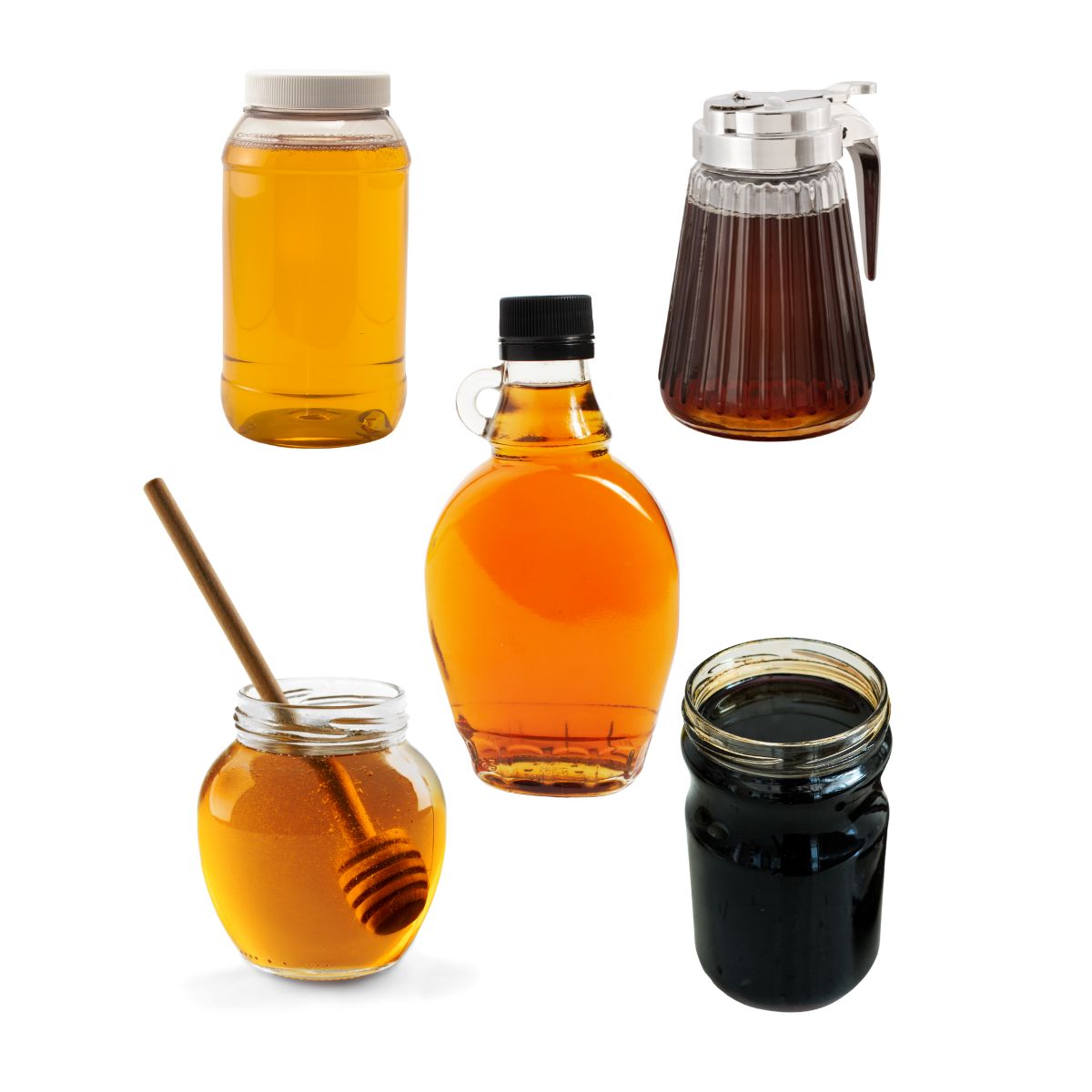
Whether you’re looking for managing blood sugar levels, or simply exploring new flavors, the world of honey substitutes offers a plethora of options. In this article, we will explore 11 remarkable alternatives to honey, each with its unique characteristics and flavor profiles. From fruity syrups to bee-free concoctions, get ready to embark on a journey of sweet discoveries.
Maple syrup
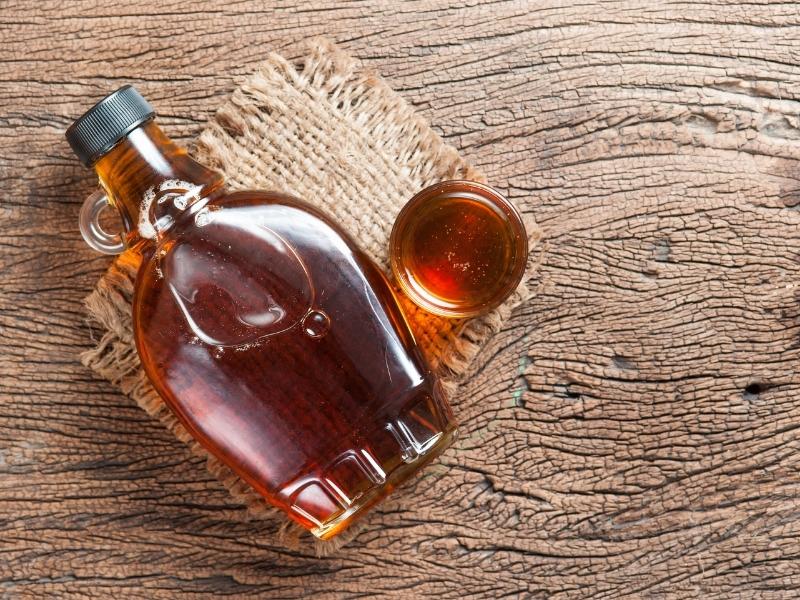
Anyone who likes to eat fresh, homemade pancakes and waffles for breakfast, knows that the best way to top them off is with real maple syrup. Its flavor profile usually has caramel, hazelnut, cinnamon, or vanilla notes layered within the woody taste of maple. And while its consistency is thicker, it’s actually a healthier alternative to honey because it contains fewer calories, less fructose sugar, and more minerals. It is also suitable for the vegan diet.
Maple syrup is made by boiling the sap of the maple tree. How long it is boiled determines its intensity of flavor and color, leading to its classification into four types. Grade A pure maple syrup can be golden, amber, dark, and very dark, while Grade B is for baking and cooking.
This sweet sap is the best honey substitute in all kinds of recipes, from baked goods to marinades. It even works in the same proportion, making it easy to use for substitution.
We use maple syrup in our recipes like maple Dijon salad dressing, maple glazed carrots, homemade BBQ sauce, homemade buffalo sauce, or sticky teriyaki stir-fry.
Agave syrup
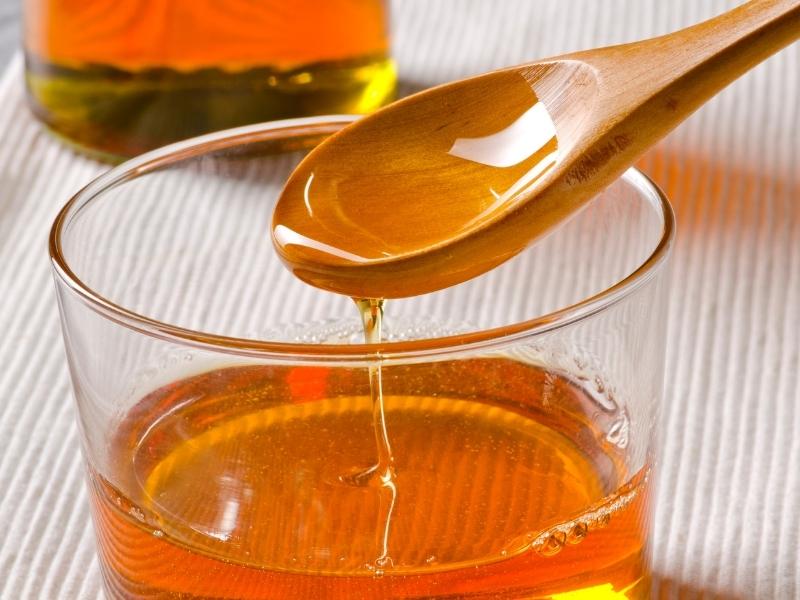
Agave nectar or syrup is made from the sap of the blue agave plant of Mexico. Once extracted, the sap undergoes heating and filtering to convert it into a vegan, natural sweetener that is fit for consumption. A lighter color is made from less heat and more filtration, while higher temperatures and less filtration give it a darker color.
Thanks to its neutral flavor profile, this sticky syrup is used in a variety of desserts and drinks, including tequila! When used in baking, use an equal measure to replace honey and lower the temperature by 70-80 Fahrenheit (25ºC). We also add it to our apple cinnamon oatmeal for breakfast.
A quick reminder that while agave syrup is a good replacement for sugar for diabetics due to its low glycemic index, it does have a lot more fructose.
Corn syrup
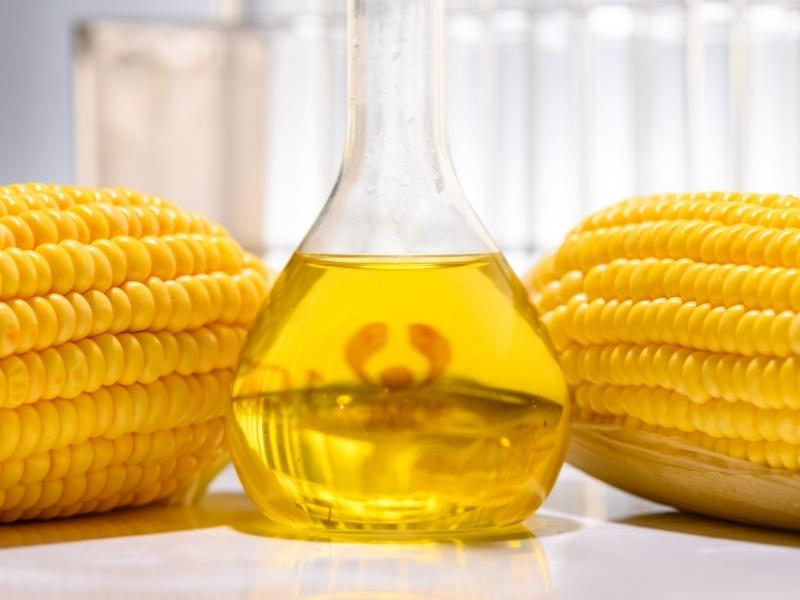
Derived from the naturally occurring sugars in corn, this sweet syrup is made by combining corn starch with water, adding enzymes, and then introducing flavoring. The two varieties available are the mildly sweet, vanilla-flavored, transparent, light corn syrup; and the sweeter, molasses-flavored, caramel-colored, dark corn syrup.
Commercial corn syrup is popular in baking due to it being an invert sugar. It’s great for making cookies, glazes, and fudge, and is an excellent substitute for honey. Just replace the honey in your recipe with the same proportions of light corn syrup or dark corn syrup, based on your preference. And avoid using high-fructose corn syrup for health reasons.
Golden syrup
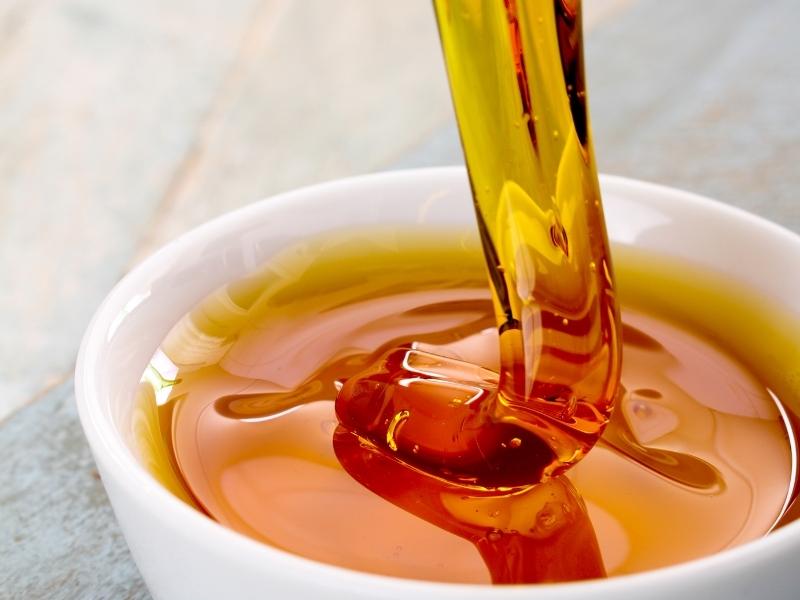
Golden syrup is made by inverting beet or cane sugar (sucrose) in water and adding an acidic ingredient. Also called treacle, the rich golden syrup comes in many grades, and is known for being thick, buttery, and caramel-like. You can use it on flapjacks, cookies, toffees, puddings, and of course, to make the famous golden syrup sponge pudding!
The fact that it is sweeter than honey but similar in consistency and color makes it perfect for the purpose of substitution in most recipes in near equal measurements. However, it is probably best to avoid it in savory dishes, as the caramel flavor does tend to be quite noticeable.
Also note that golden syrup is highly processed and contains a large amount of sugar, making it less than ideal for your health.
Date syrup
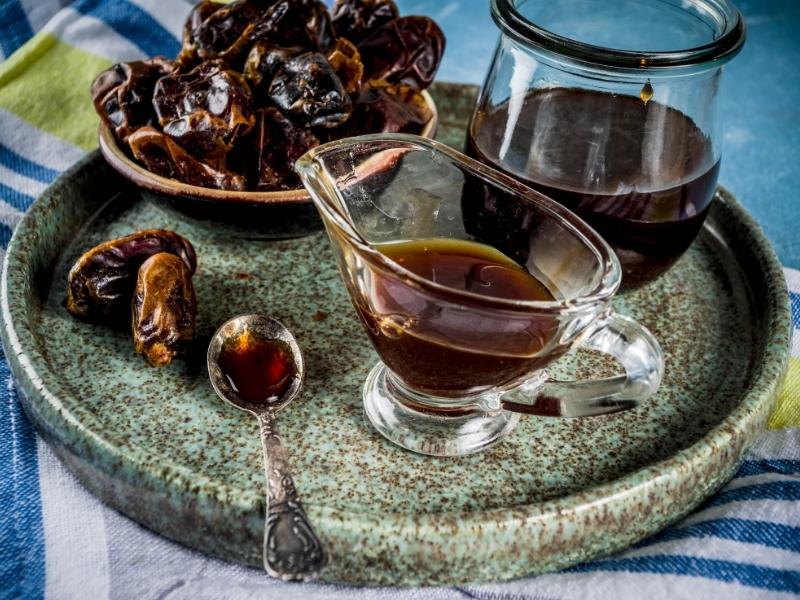
Date paste or syrup is one of the oldest natural sweeteners, and it can be made at home if you have dates, water, and some lemon juice. It just takes blending them together to reach your desired consistency.
While generally more chunky and pasty than the average store-bought syrup, this not only vegan, but whole foods plant-based alternative is just as sweet as honey, and can be used in a 1:1 ratio when making substitutions. Date syrup imparts a natural caramel-like flavor to baked goods and even helps in the browning process, making it a great option for baking.
One of the best things about date syrup is that it has virtually no drawbacks when it comes to health. It’s loaded with antioxidants, vitamins, and minerals.
Molasses
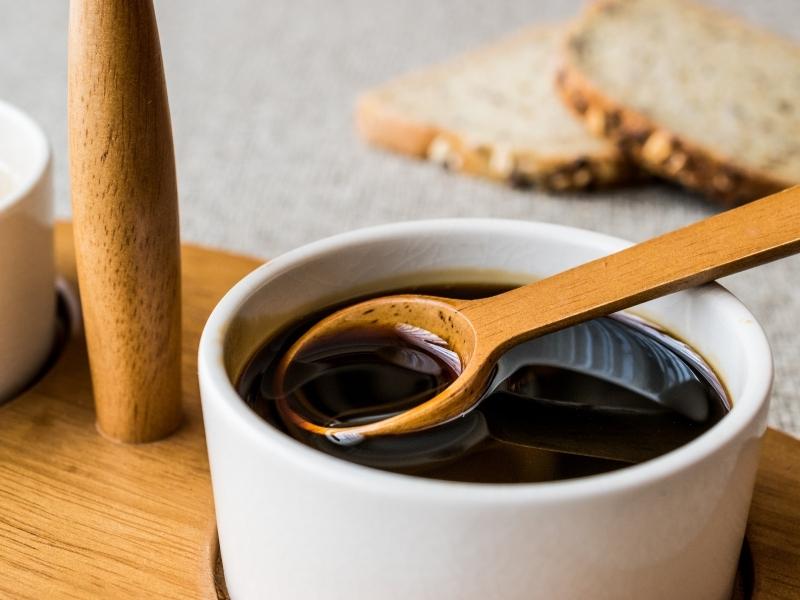
Molasses is the thick, dark, sticky syrup byproduct obtained during the manufacture of refined sugar from sugar cane or sugar beets. Black treacle is a dense syrup made from cane molasses, and is the “British term for molasses.” With an intense bitter-sweet taste and dark coloring, this is what is often used in Christmas puddings, toffee, fruit cakes, and other baked treats.
While molasses does have a bitter aftertaste and can be heavy on digestion, it is also packed with antioxidants and other nutrients that make it a fantastic alternative to honey.
Before you start cooking, it helps to know about the three main kinds of molasses.
- Light molasses is the sweetest, lightest, and can be used instead of honey in the same ratio.
- Dark molasses is intensely colored, and flavored with notes of bitterness obtained after a second boiling. This is best used at half the quantity of honey. We use this to make our caramel apple crumble (pictured below) and caramel apple crisp pie.
- Blackstrap molasses is the most potent of them all, dark, deep, and bitter. This dark horse is the perfect way to spice up your savory dishes. We use this to make homemade BBQ sauce and enhance the flavors of the orange sauce in our vegan orange chicken, orange tofu, and orange cauliflower recipes.
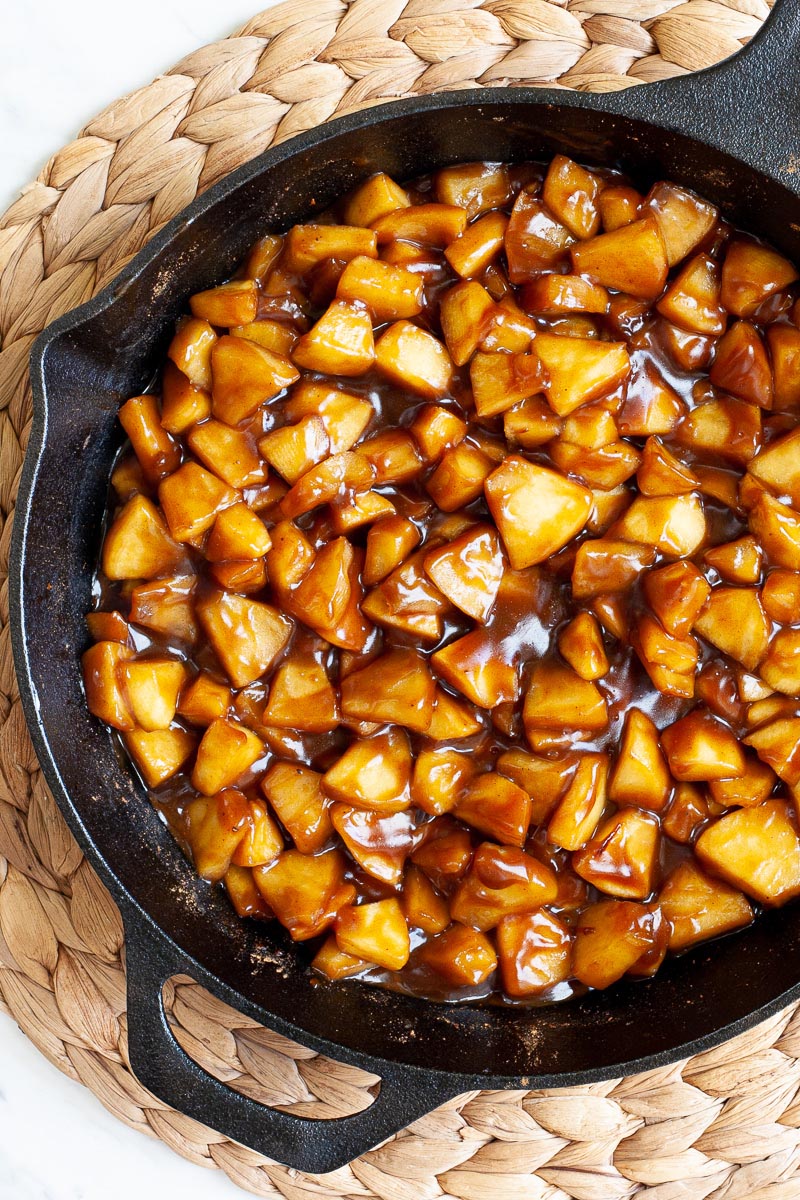
Coconut nectar / coconut syrup
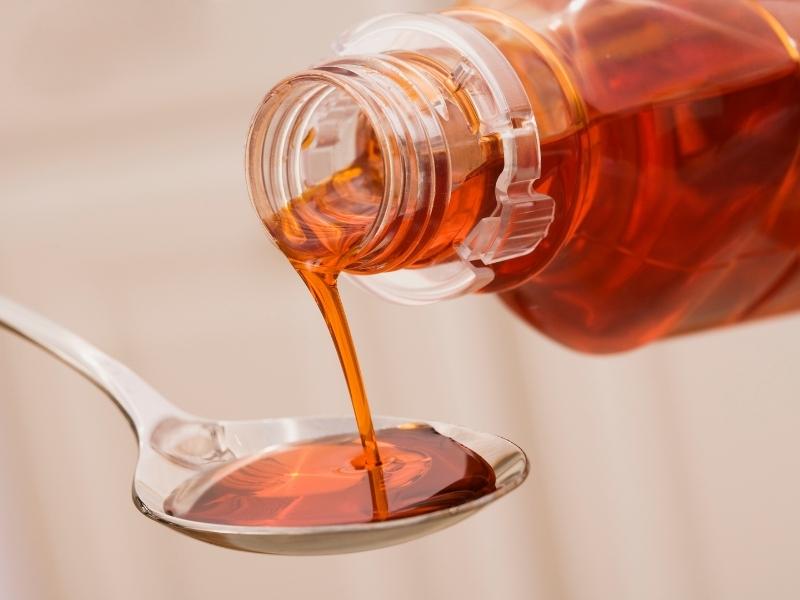
Coconut nectar is made by drawing sap from coconut trees and boiling it till it reaches the desired viscosity.
On the other hand, coconut syrup is slightly more processed and involves the addition of coconut sugar to water. With low glycemic indexes and high micronutrient content, both are great honey replacement options.
Its coconutty taste adds a delightful twist to your recipes and being just as sweet and dense as honey, can be used at the same ratio in cooking and baking. Just keep an eye out for brands that add palm oil to their product because of the ethical issues it poses.
Brown rice syrup
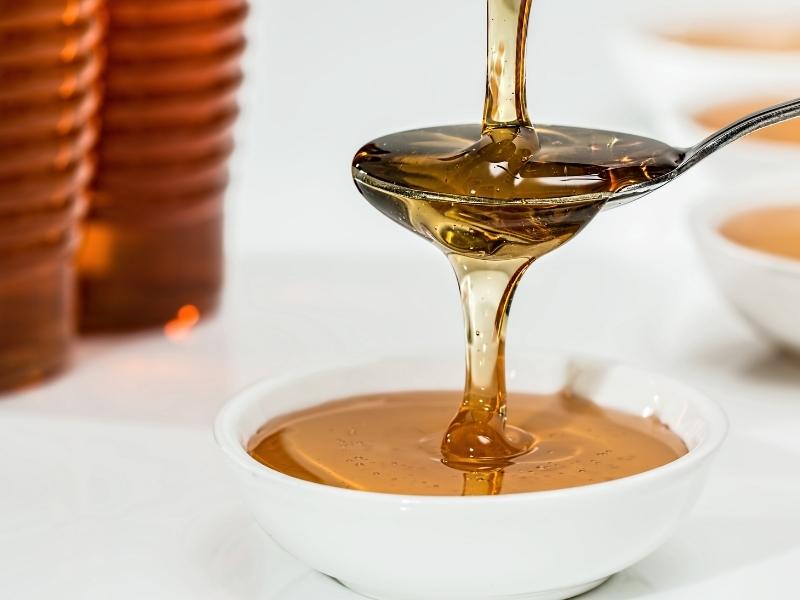
Brown rice syrup, rice malt, or rice syrup is considered one of the best substitutes for honey. Vegan, natural and gluten-free, it is a thick sugary syrup derived from fermented brown rice.
Substitute honey with the same amount of rice malt syrup in recipes as they have about the same level of sweetness consistency. It’s also safe to use for baking as well!
It’s difficult to find and a bit heavy on your wallet too. So remember while using this honey alternative, moderation is key.
Barley malt syrup
Mainly composed of maltose, this natural sweetener features heavily in vegan baking and is made by heating barley sprouts in vats till they form a dark, heavy, and concentrated syrup. It is considerably less sweet, with a malt-like taste similar to molasses.
Barley malt syrup is used the same way and in the same quantity, as you would honey. It has a similar consistency and you can replace it in your recipes without having to change too much about the recipe. However, it has little to no nutritional value. And sadly, it is not gluten-free since barley is a gluten-containing grain.
Liquid stevia
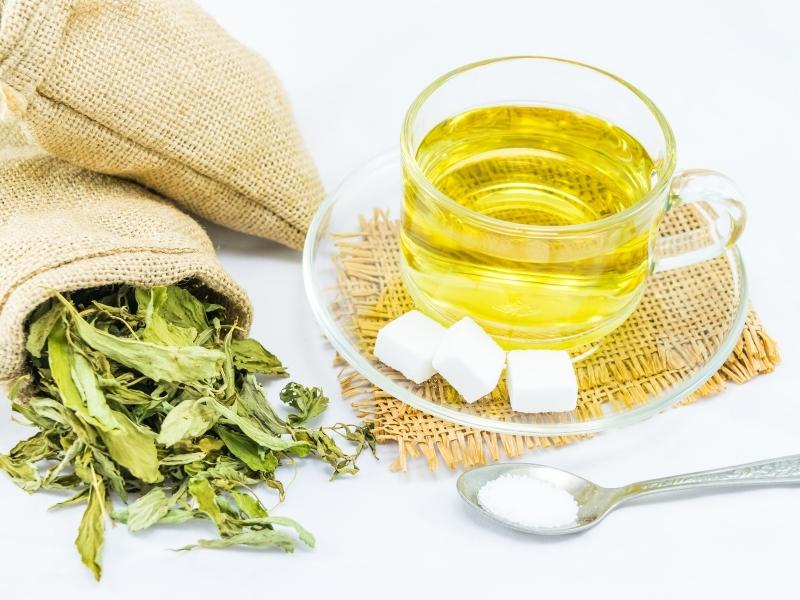
Liquid stevia is a natural sweetener derived from the crushed leaves of the South American Stevia plant and is about 10-15 times sweeter than honey. This zero-calorie alternative has a glycemic index of 0. Just be cautious when adding it to your baking because it does tend to leave a slightly bitter aftertaste.
Vegan honey
Honey is not considered vegan because it is produced by bees, and consuming honey involves the exploitation of bees and their hives. But anyone else interested in trying can find a surprisingly wide variety, albeit their price is not budget-friendly.
If you want to try something other than the classic sweeteners from above, look at the store-bought products developed as vegan honey substitutes. We name the TOP 3 most well-known brands, but there are many more in our vegan honey substitutes article.
Homemade honey substitutes
Yes, you can make a sweetener similar to honey in your own kitchen. Would you have guessed that you can turn apples, chamomile, dandelion, and corn cobs into honey? Here is a list of recipes you can try:
Why do you need honey substitutes?
Honey has been used in cooking, making homemade remedies, burn treatments, and cosmetics for centuries. It’s packed with antioxidants and nutrients, and even has antimicrobial properties!
However, it takes 556 worker bees collecting nectar from 2 million flowers to create just one pound of this liquid gold. And that’s before they even start the complex process of converting the nectar into the simple sugared liquid we all love. So, keep reading to learn more about it and see our list of honey alternatives when you need to sweeten your dishes.
Honey is not vegan
The truth is that the changing climate, large-scale pesticide use, and industrial exploitation are all leading to the extinction of our magnificent bees. And since it is ultimately made by them and for them, vegans refrain from consuming honey.
You simply ran out
Do you need a dollop of sticky goodness for your recipe and only then realize you’re fresh out? Or maybe you haven’t found time to go to the grocery stores yet. Either way, our list of alternatives for honey will come in handy!
You don’t like the taste
Honey is not just sweet! Depending on the source of the nectar, honey can vary greatly in taste, smell, and color. It can be fruity, spicy, smokey, floral, earthy, or even nutty. Its smell can be anything from fresh to pungent, and its appearance can be clear or dark-colored. Some people dislike this variation in organic honey, and the industrial blend is often super-sweet, making it common for many to dislike it.
You are allergic
While honey is safe for most people, some are allergic to it because of the pollen or bee proteins it contains. Although uncommon, there are some cases of severe reactions.
If you want to bake
Ayurveda, the ancient Hindu system of medicine, has a simple rule regarding honey: Never cook it! Even science has confirmed that prolonged exposure to heat changes everything about honey – its taste, color, texture, and benefits.
Studies by the National Center for Biotechnology found that heating honey above 100 Fahrenheit (ca. 38 °C) results in the loss of important nutrients, enzymes, antioxidant, and antimicrobial properties, making it bitter. So, honey is probably not your best option if your recipe calls for popping your pie in the oven at 350 Fahrenheit (ca. 177 °C).
FAQs
If all else fails, you can always reach for the dry sugar (white or brown sugar) on your shelf. It is sweet, dissolves well, and is best used as a substitute in a 2:1 ratio. That is two spoons of white sugar for a spoonful of honey. To compensate for the liquid part of honey, add ¼ cup of liquids (as simple as water) to 1+¼ cups of sugar, for every cup of honey.
Liquid stevia is the closest substitute since it is already in liquid form. Erythritol, monk fruit extract, xylitol, and inulin can be used quite differently for cooking and baking.


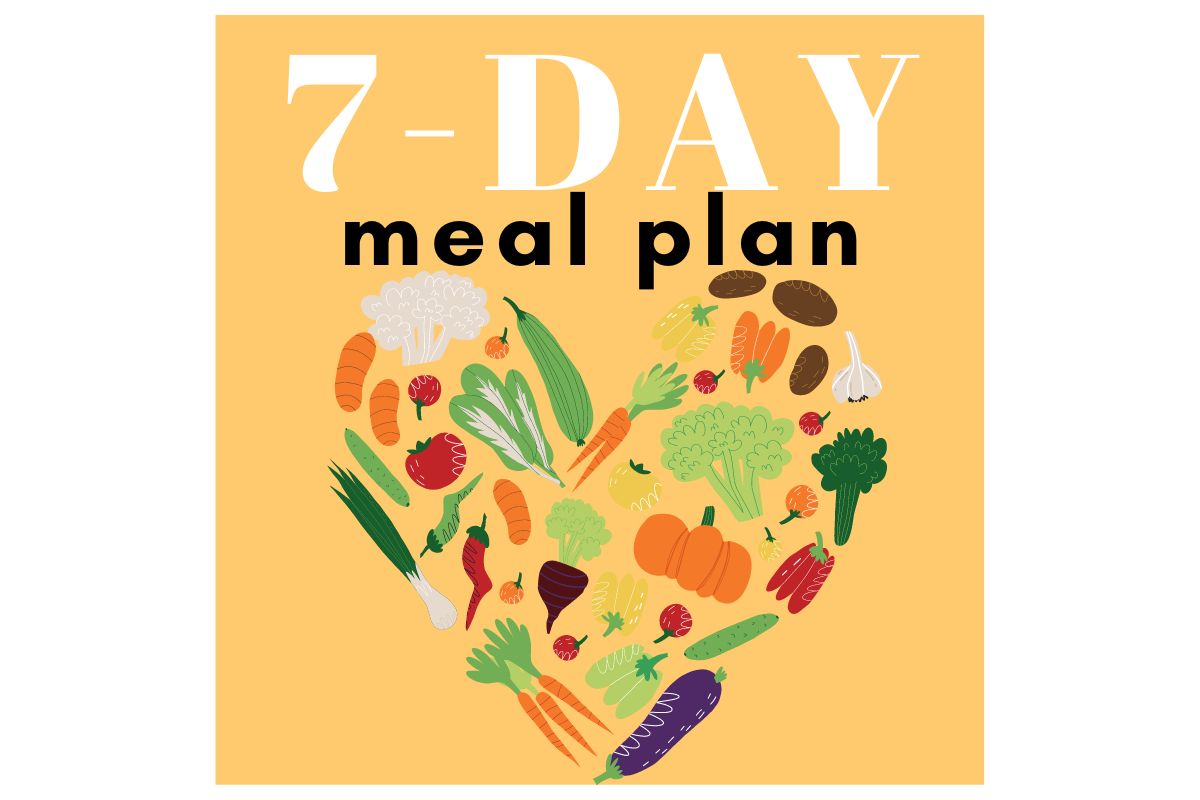

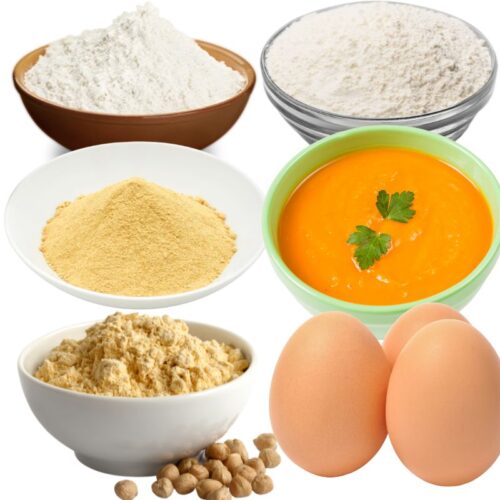
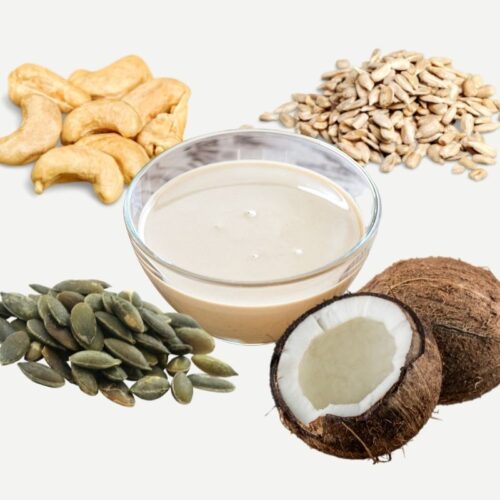
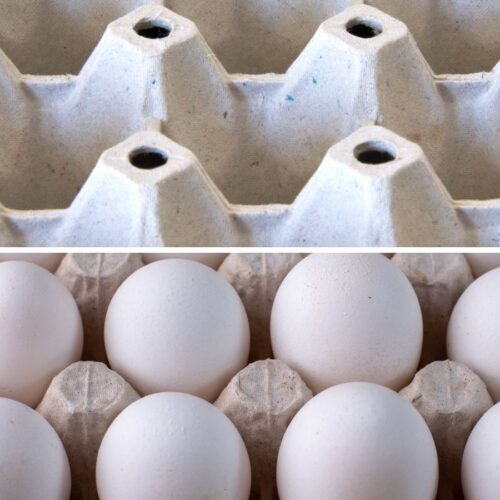
Leave a comment